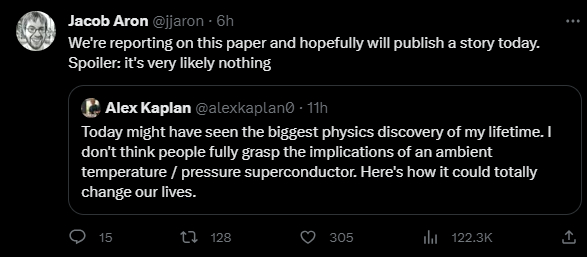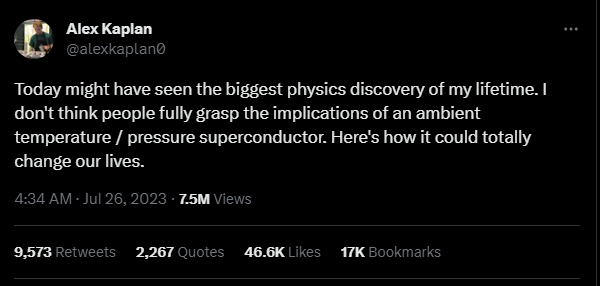“For the first time in the world, we succeeded in synthesizing the room-temperature superconductor.”
That’s the opening line of a paper submitted by researchers at the Quantum Energy Research Centre, Inc. and Korea University—a paper which could become a seriously big deal, if the findings are ratified. Thing is, the scientific community isn’t so sure they will be.
Superconductors are absolutely key to devices such as quantum computers. They’re used to form the fundamental qubit, which requires immeasurably tight operating conditions in order to produce accurate results. The issue is that we don’t know of any materials that act as superconductors that don’t also require extremely cool, sub-space temperatures to do so. Therein lies one problem with superconductors and their wider use today.
But superconductors have many properties that are extremely important. They’re absolutely energy efficient, in theory, requiring no cooling for electrical conductivity. In this popular Tweet (X, sorry) thread from Alex Kaplan, a frozen coffee connoisseur and Princeton Physics graduate, he explains how a valid room temperature superconductor could enable lossless energy transfer, enable new nuclear fusion concepts, create incredible batteries, make entirely efficient computer chips, and even make MRI machines and MagLev trains cheaper and easier.
You can see then why a material that operates as a superconductor at room temperatures, or thereabouts, is perhaps a little exciting.
The paper lays out a superconductor called LK-99. It’s easy to produce, likely mass manufacturable, and works at both ambient temperature and pressure.
But there’s a catch. I’ve trawled through the reaction to the announcement from the scientific community and found that some are initially sceptical about the claims made in the paper.
Firstly, the paper’s finding are yet to be replicated, which will be the watershed moment for any of its claims.
Then there’s the news editor for the famed scientific publication New Scientist, Jacob Aron, mentioning that they’re looking into this and “Spoiler: it’s very likely nothing.”

Ouch, that stings.
There has also been another claim to this world first breakthrough, and the reason you haven’t been living in a utopia since is because that claim hasn’t been well received since. In 2021, a physicist named Ranga Dias had a paper published in the Physical Review Letters journal that claimed to have discovered a room-temperature superconductor. This paper was subsequently retracted due to alleged data fabrication.
That 2021 paper is not directly linked to this one, and has no impact on its ratification, but it does show that any claim to this sort of incredible breakthrough has to be taken with heaps of salt until it’s widely proven to be true.
Though you can’t blame anyone for wanting this to be true. The ramifications of discovering a working room-temperature superconductor are massive—it’s not an understatement to say such a breakthrough could be ultimately game-changing for society. Whether we’ll see one in our lifetime, however, that is something no one can say for certain. At least this paper could be, if nothing else, a step in the right direction.




